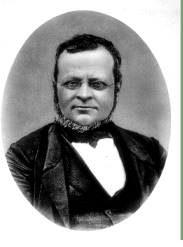







As so-called rational individuals, there are certain things in our lives that inform of us -- to paraphrase Benjamin Franklin -- of who we are, where we have come from, and where we are going. One of these things is our identity. If you are a German looking back into the nineteenth century, you will probably scratch your chin in wonderment at why on earth Prussia ever became to be part of what one knows, and understands today, as Germany. However, if you're an Italian, you will probably look at the nineteenth century with pride, joy, and all that which makes one's heart glow -- particularly because of one singular event that helped shape and define what modern Italy is today: unification.
The word 'unification' brings up different ideas for different people. For Germans, it will mean something else -- perhaps Bismarck and the three wars he helped engineer -- whereas for Italians, it may bring up three different kettle of fish (so-to-speak): Cavour, Napoleon III, and Orsini. Whilst the latter perhaps was a minor player in the unification, quite paradoxically, he played an important role since it was he who gave Napoleon free berth to consolidate his already-whetted appetite for territory. He did this simply by trying to assassinate the French statesmen -- in January 1858. The following month, he wrote a letter to Nap III pleading him to take the course of Italy. Apparently, Orsini's desire was to get Austrian domination out of Italy. (Why he ever thought assassinating Nap III was gonna do the trick is beyond one's comprehension :-/).
In July 1858, Nap III secretly met up with Cavour at Plombieres in order to provoke a war between
Austria and Piedmont-Sardinia. Consequently, Savoy and Nice went to France. Lucky reward, one supposes, for
Nap III's ingenuity. Soon after, Cavour mobilized the army along the frontier and Austria went to war.
On June 24 1859, there was a battle -- Battle of Solferino -- where the Austrian army was defeated. This was the second defeat the Austrians were to suffer,
after the miserable military record they had scored, if you will, on June 4th at Magenta. Rich argues that their "military leadership proved to be as inept as its diplomacy".(p.135)
July 1859 is equally significant in the tale of Italian Unification since it was this same month that the Preliminary Peace of Villafranca was agreed upon. The concession made here
was that the Austrians would give rights over Lombardy to Sardinia-Piedmont. In fact, Nap.III had reasons -- "compelling ones" -- for peace. Rich illustrates them quite clearly:
- War much more difficult and costly than he envisaged.
- He was afraid of "ominously restive" public opinion turning against his support of major and lengthy military effort.
- Sardinian military and Italian support for war -- fallen short of his expectations (Rich, 135). Instead, there were revolutions in Central Italy, Tuscany, Parma, Modena and Papal states. The direct consequence of these revolutions was the Treaty of Zurich, which brought a final peace concluded with Austria.
In late 1859, Cavour started to pay more attention to the diplomatic situation, returning to office as Head of the Sardinian Govt in January 1860. He subsequently decided to hold plebiscites (or referendums) in all revolting duchies of Parma, Modena, Tuscany, etc...
In March 1860, the pro-Sardinian governments of Tuscany, and Emilia announced that the plebiscites would be held in ten days on the proposition annexation to the constitutional monarchy of King Victor Emmanuel II. The consequence of this was rather dubious -- a bit like a non-democratic government running "free and fair" elections (for the first time) without int'l observers -- in that there were IMMENSE majorities in favor of annexation with Pro-annexation votes larger -- note this -- than the number registered.
On March 12, a bargain over Nice and Savoy began. These two provinces were sealed in a secret treaty signed by Victor Emmanuel II in Turin and by Nap III two days later in Paris.
On the Wisdom of Ceding Nice & Savoy
Was the cession of Nice and Savoy by Cavour a sagacious decision? According to Rich, it was one of his most dangerous and political gambles. This cession, ostensibly to sustain the alliance with Nap.III, was detrimental in that it cost him the confidence of the philhellenic Palmerston, who now saw him as the French emperor's puppet and, hence, deemed unreliable.Although the Sardinian Parliament approved of the treaty with Nap III, the cession of Nice and Savoy aroused considerable antagonism between Italian patriots -- making Cavour an implacable enemy, especially of Garibaldi (1807-82), particularly since it was his birth place.
This move was soon to force the spotlight of popularity away from Cavour to Garibaldi, who was eventually to make considerable progress towards the Unification of Italy.
What do the Realists argue?

First of all they argue that the principal reason for BRITISH anger was because they wanted AUSTRIA as a counterweight to RUSSIA.
Secondly, the BRITS wanted at all costs to prevent aggrandizement of FRANCE as this would undermine the so-called balance of power. Why? Well, this was because due to France's steam power, the French were at an advantage, because it made them the most sophisticated navy, which -- ofcourse -- Britain considered a threat. That said, Palmerston made no (direct) move to prevent the aggrandizement of Italy because Britain itself was in an isolationist phase.
Garibaldi
Unlike the politically cunning Cavour, Garibaldi was a single-minded patriot -- straightforward, blunt, unselfish with respect to his ambition. With a great belief in direct action -- rather than meticulous planning -- Garibaldi took action with little regard for the consequences. It comes as no surprise therefore that he saw no need in buying off the French, though he did feel compelled to solicit the aid of King Victor Emmanuel II. This gave him the perfect excuse to claim that he was acting on royal authority. (Wouldn't anyone?)After having been exiled to Argentina, he came back on May 5 1860 with his Thousand Red Shirt army and formed an army. He subsequently took ship at Sardinian port of Quarto, near Genoa. His army fought and sailed under the Sardinian Tri-color flag and, after landing at the Sicilian port of Marsala, on May 11, proclaimed himself dictator of Sicily in the name of Italy and King Victor Emmanuel II. However, Garibaldi's successes not only created new dangers, but also new opportunities for Cavour.
DANGERS:
First up, Cavour feared Garibaldi might be seduced by ambition and popular acclaim to assume supreme authority himself and establish a...regime in Sicily(Rich, 141). In other words, he feared
Garibaldi becoming a dictator.
Secondly, if Garibaldi succeeded in conquering Naples, he might continue his drive up the peninsula into the Papal States where he could
clash with French troops.
OPPORTUNITIES:
Cavour sought to EXPLOIT the collapse of Bourbon rule. Consequently, he sent an agent to Sicily who was well-equipped
with (1)funds for bribes and (2)secret negotiations/instructions to take over the government of the island from
Garibaldi -- all this as well as prepare annexation of Sardinia. Well, the plan FAILED -- much to the
chagrin of Cavour -- and on May 7, Garibaldi ordered agent's expulsion from the island.
A Very Unhappy Cavour
After having conquered Sicily, Garibaldi took over Naples. Within a couple of weeks, he was successful, and by September 1860, he was ready to cross the STRAITS OF MASSINA. In the same month, Cavour sends ultimatum to POPE demanding that the Pope disbands Garibaldi's army of mercenaries. Unfortunately for Cavour, his plan turns pear-shaped on him when the Pope refuses to disband. Subsequent to this abortive attempt to frustrate Garibaldi's plan's, Cavour finds with shock horror that SARDINIAN forces have reached the frontier of the Papal States. Consequently, the easy defeat of the Papal army and advance into Neapolitan territory is well and truly rubber-stamped, where they join forces with Garibaldi in the final stages of the campaign against the Bourbon regime.
The French Connection
The French publicly denounced the Sardinian invasions as an act of blatant aggression. However, they did nothing to stop it. As for Nap. III, he was meanwhile on a cruise in the Mediterranean where he was to remain at sea for about twelve days.Assessment
History has an inherent tendency to pooh-pooh important figures, but always manages to stay focussed at least. That said, one is not going to get much positive feedback on Garibaldi's action -- though justified he thought. Fortunately, most historian's convictions remain intact in the belief that Garibaldi demonstrated that he was a true, Italian patriot -- not just a mere Rebel With A Cause. Furthermore, the historians opine that Cavour had no reason to fear him -- though ostensibly, fear he did have for Garibaldi. As a consequence, on OCTOBER 15 1860, Garibaldi, our man of the hour, signed a decree proclaiming that all his conquests should, as a result, become part and parcel of Italy under its constitutional monarch, Victor Emmanuel II. A plebiscite was held, culminating in favorable results all over in the territories.As Rich points out on p.143, The Sardinian government did not act with the same degree of magnanimity as Garibaldi, for they refused to grant him any significant civil military position. Eventually, Garibaldi returned to his island home off the Coast of Sardinia. Red-Letter Day for Italy!! : March 17, 1861, establishment of Kingdom of Italy proclaimed.
Significance
The significance of Unification is multi-faceted. However, one principal thing that stands out is that it marked the imminent end in Central Europe, as well as bringing closure, or finality, to the settlement of 1815. Secondly, if it proved anything, it was that NATIONALISM was of greater import than LIBERALISM -- a great force for change. Meanwhile, BISMARCK, the quintessential opportunist, was closely watching from the Prussian perch, while strongly feeling that Unification had set a precedent -- for his own plans.
| B of P? | Timeline | Back to POL-211 Home Page |
Copyright © Politics 211 Website Online 1998-2001